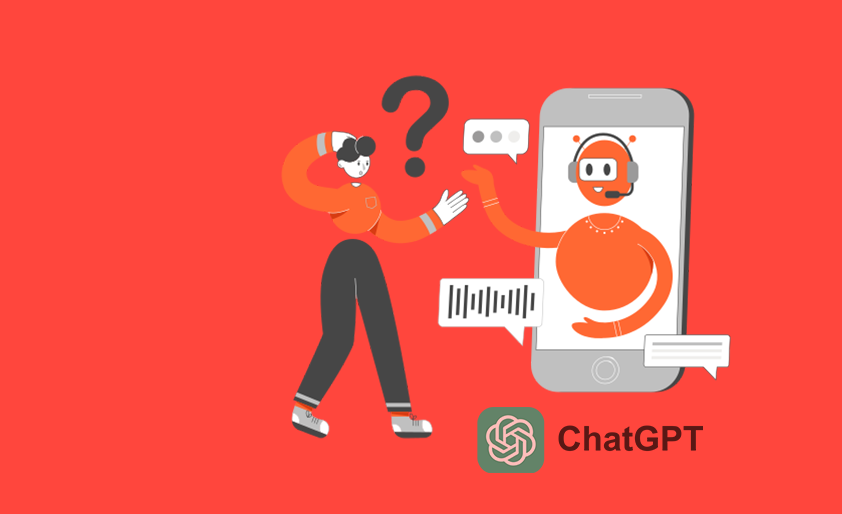AI: here to help or harm? The controversy & ethics of ChatGPT
In the ever-evolving universe of artificial intelligence, one creation stands out - ChatGPT. It's a testament to the cutting edge of natural language processing. With its astonishing capabilities, innovative features, and mind-blowing intelligence, we can only marvel at the abilities it showcases.
This groundbreaking creation, however, casts a shadow of profound ethical concerns that demand our immediate attention. As one of the latest trends, it's also one of the most contentious hot topics, sparking debates on whether AI tools are here to help or harm humanity.
Why ChatGPT is trending now
As we admire the amazing benefits AI tools like ChatGPT offer us, we cannot ignore the controversies following its creation. Is it serving humanity responsibly? What are the main ethical issues? Are we losing our jobs to AI? Can we responsibly use AI tools for the betterment of humankind? We'll answer these and other questions as we explore this trendy new tool.
We cannot ignore the obvious - major ethical issues accompany the existence of AI tools, so let’s confront them. We’ll cover the potential benefits, consider the risks, and tackle the ethical concerns surrounding artificial intelligence leading this technological revolution.
But what is ChatGPT? What are the ChatGPT issues the hype is all about?
The promises of ChatGPT
Before we dive into the details, I'd like to introduce you to ChatGPT. It's an app developed by OpenAI that uses the GPT (Generative Pre-Trained Transformer) language models to operate. It can answer questions, draft emails, write essays, create speeches, compose poems and drawings, automate tasks, summarise content, write complex code, and even hold conversations.
Moreover, it's a free tool (with an advanced paid option) containing vast content libraries from textbooks, articles, and other sources. It hosts copious amounts of data and information - much like the internet.
ChatGPT impresses with its large language model (LLM) and its ability to answer various complex and complicated questions. When a user inserts text-based prompts, the app can provide cohesive insights on countless topics through OpenAI's GPT-3.5 and GPT-4 foundational GPT LLMs.
Due to its remarkable ability to interact and converse in a human-like way, this highly capable "chatbot" quickly became hot news - a trendy sensation soon after its launch in November 2022.
Benefits vs potential risks
With the promise to revolutionise information accessibility, enhance customer service, and personalise suggestions, there's no doubt ChatGPT will make our lives easier, right? Well, maybe not. Beneath the surface of its proficient data processing and limitless coherent responses are the risks of misinformation, institutional and sample biases, cyber security threats, plagiarism, compromised confidentiality, and data manipulation.
In its innocent quest to assist, ChatGPT could unwittingly become a conduit for spreading false information, inventing fictitious "facts", and creating fake news. Moreover, malicious users can misuse ChatGPT - they have free reign to cause irreparable damage through unethical practices. A scary thought, right?
“With great power comes great responsibility,” but like a teenager, AI is vulnerable, naive, and ignorantly "believes everything it's told," which raises alarming red flags.
Unveiling Bias in ChatGPT
AI bias is described as "the systematic and repeatable errors in a computer system that create ‘unfair’ outcomes, such as ‘privileging’ one category over another in ways different from the intended function or algorithm". Biased ChatGPT reinforces inequalities, fuels harmful stereotypes and subjects individuals to unfair treatment based on gender, race, and other facets.
Addressing and rectifying biases within ChatGPT is imperative to ensure fairness and inclusivity in its responses, which involves delving into its origins and detection. So, whose responsibility is it to solve these problems? According to the NIST (National Institute of Standards and Technology) report, the perception of bias in AI systems is solely a technical issue.
This perception, however, is challenged, and NIST recognises that significant portions of AI bias originate from human biases and systemic factors such as institutional biases. They aim to search and identify the needed requirements to cultivate trust in AI technologies and claim that trustworthy AI systems are “reliable, safe, secure and resilient, accountable and transparent, explainable and interpretable, privacy-enhanced, and fair with harmful bias managed.”
Mitigating AI Bias - fairness and accountability
A strategic approach is needed to mitigate AI bias. Strategies must be implemented, such as evaluating processing algorithms, scrutinising training data, and analysing ChatGPT's output to enable us to recognise and correct bias practices. A collaboration of principles, technology, and social fairness is fundamental among diverse stakeholders and society.
Transparent and interpretable algorithms, ensuring individuals understand their workings, are needed to identify and resolve bias more effectively. By cultivating inclusivity and manifold collaboration in ChatGPT's development and testing, we can mitigate bias, honour varied perspectives, and promote a more equitable and impartial AI.
To ensure its responsible development and use, we must implement ethical guidelines deeply rooted in accountability and transparency to protect privacy and promote non-discrimination.
The first case of AI “Hallucinations”
An ignorant lawyer faced sanctions and fines in August 2023 after a federal judge in New York found himself in unprecedented circumstances.
After using ChatGPT to compile a legal brief to support his case, Steven Schwartz, a lawyer from Levidow, Levidow & Oberman, became famous for all the wrong reasons. Judge PK Castel couldn't help but notice the "nonsensical" and "gibberish" portions of the filed brief. It also contained false quotes and misinformation and hilariously cited fictitious case law.
The judge first allowed Schwartz to rectify the filing, but he brought the hammer down hard after confronting him about the discrepancies again. In his defence, Schwartz claimed ignorance, stating he did not know ChatGPT “was not a search engine, but a generative language processing tool.”
It turns out that ChatGPT cited six fictitious cases to show precedent, all in support of his client’s position. The clueless lawyer took the word of his college-age children and blindly used the AI-generated brief to compose an official filing, which he signed and submitted without review.
Ethical implications: a call to action
The shortcomings of AI extend beyond a long list of limitations. Without a doubt, the ethical issues surrounding ChatGPT are paramount, and society and AI share the responsibility of ensuring its responsible use. Transparency, fairness, and accountability emerge as key principles that must guide its development. This effort may successfully address biases and privacy concerns, preventing discrimination and protecting sensitive information while holding users and developers responsible for AI’s actions.
Additionally, a human-centred approach, aligned with human values and interests, must be a priority, aiming to maximise benefits while minimising harm to individuals and society. The principles of beneficence and non-maleficence should apply, emphasising promoting well-being in AI systems while avoiding damage.
Implementing these frameworks, however, poses challenges. The complexity of algorithms makes transparency difficult, and biases can inadvertently be present in AI due to training data. Nevertheless, refining ethical frameworks is crucial for the responsible use, further development, and the future of AI technologies.
A shared burden and duty
The responsibility to develop, grow and use AI tools like ChatGPT is a shared burden - maximising benefits while minimising harm. ChatGPT's creators bear the weight of its creation and are responsible for ethically developing and inventing the technology, prioritising humanity's best interests. This responsibility is twofold: they must consider the potential consequences of ChatGPT's actions while ensuring a steadfast adherence to ethical principles.
In turn, the guardianship of ChatGPT lies with its users, who are responsible for utilising it selectively and conscientiously. They must ensure its usage does not harm, respecting privacy and autonomy while remaining mindful of potential consequences and using it with unwavering ethics.
It starts with individual comprehensive ethical training for AI systems like ChatGPT. Not only will it empower users and developers, but it will also help cultivate the necessary knowledge and skills to wield AI technology responsibly. But it will take a collaborative effort among all parties to craft ethical guidelines.
Shaping a responsible future with AI
To successfully navigate ethical concerns surrounding ChatGPT, we must balance its potential benefits and risks. Implementing ethical frameworks, providing transparent algorithms, and addressing bias are essential for responsible AI use. Collaboration among stakeholders is key in shaping a future where ChatGPT serves humanity's needs while upholding our priceless values.
If we foster dialogue and remain committed to ethical development, can we positively harness the transformative power of AI to improve various sectors of society? If we can, there may be a future where AI tools like ChatGPT can become a trusted resource, enhancing our lives and reflecting our shared humanity.
How can we help shape a responsible future with AI? Becoming part of the solution and joining in on the hot topics and trending conversations around ChatGPT issues will ensure we sidestep further AI “Hallucinations” and other ethical catastrophes.
Whether you like it or not, we're on a journey towards a responsible, transparent, and ethical collaboration between humanity and artificial intelligence.

Article by Polly
CasinoWow Contributor
Hey guys, my name is Polina but my friends and colleagues call me Polly. I am truly passionate about online casino gaming and exploring the different online gambling experiences. I'm really into diving deep into topics and researching all the details. My aim is to gather the best information and write interesting articles for all the readers at CasinoWow.


.png)




